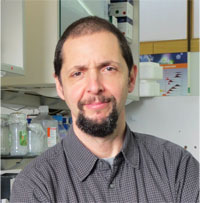Jose Antonio Rodriguez Perez
Introduction

Phone: 94 601 8072
Email: josean.rodriguez@ehu.es
Office Location: School of Medicine and Dentistry. Room AM 7.2
Research Group: MOLECULAR BIOLOGY OF CANCER
Teaching Profile
Since 2007, I am a lecturer at the School of Medicine and Dentistry, University of the Basque Country (UPV/EHU). I teach the subjects Medical Genetics, Introduction to Biomedical Research and Research Project in the Degree of Medicine. Regarding post-graduate teaching, I am a lecturer and coordinator of the course Molecular Bases of Cell Proliferation, Differentiation and Death in the Master in Molecular Biology and Biomedicine of the UPV/EHU.
Between 2001 and 2006, before joining the UPV/EHU, I participated in the Master in Oncology of the VrijeUniversiteit in Amsterdam, The Netherlands, as a lecturer and supervisor of master student projects.
Research profile
I earned my PhD at the University of the Basque Country (UPV/EHU) in 1998 with a study on the genetic factors that contribute toHPV-induced cervical carcinogenesis. I carried out post-doctoral research (1998-2000) at the Westmead Institute for Cancer Research in Sydney, Australia, and later (2001-2007), I worked at as research fellow at the Department of Medical Oncology of the VrijeUniversiteit in Amsterdam, The Netherlands. My research work focuses on the molecular mechanisms of malignant transformation. I have published over 50 articles in research journals, and I am the (co)director of 6 PhD Theses (4 completed and 2 in progress).
In 2007, Ijoined the UPV/EHU. With funding from MICINN, the Basque Government (Saiotek and Etortek Programs), and the University, I have established a new research line on the molecular mechanisms of cancer. Specifically, our current work focuses on two basic processes that are altered in tumor cells: protein ubiquitination and nucleocytoplasmic transport. Our ultimate goal is to contribute to the development of new targeted anticancer therapies.
I am a memberof the Ethics Committee for Research with Biological Agents (CEIAB) of the UPV/EHU and a member of the Board of the Spanish Association for Cancer Research (ASEICA).
I collaborate with national and international research groups.Our group is part of a recently approved European COST Action (Proteostasis), to promote exchange and collaboration between European research groups working on ubiquitin-mediated protein regulation.
Publications in the last 5 years
1. Truncated SALL1 Impedes Primary Cilia Function in Townes-Brocks Syndrome.
Bozal-Basterra L, Martín-Ruíz I, Pirone L, Liang Y, Sigurðsson JO, Gonzalez-Santamarta M, Giordano I, Gabicagogeascoa E, de Luca A, Rodríguez JA, Wilkie AOM, Kohlhase J, Eastwood D, Yale C, Olsen JV, Rauchman M, Anderson KV, Sutherland JD, Barrio R.
Am J Hum Genet. 2018 Feb 1;102(2):249-265. doi: 10.1016/j.ajhg.2017.12.017.
s
2. Therapeutic Effects of XPO1 Inhibition in Thymic Epithelial Tumors.
Conforti F, Zhang X, Rao G, De Pas T, Yonemori Y, Rodriguez JA, McCutcheon JN, Rahhal R, Alberobello AT, Wang Y, Zhang YW, Guha U, Giaccone G.
Cancer Res. 2017 Oct 15;77(20):5614-5627. doi: 10.1158/0008-5472.CAN-17-1323. Epub 2017 Aug 17.
3. A cellular reporter to evaluate CRM1 nuclear export activity: functional analysis of the cancer-related mutant E571K.
García-Santisteban I, Arregi I, Alonso-Mariño M, Urbaneja MA, Garcia-Vallejo JJ, Bañuelos S, Rodríguez JA.
Cell Mol Life Sci. 2016 Dec;73(24):4685-4699. Epub 2016 Jun 16.
4. Conformational stabilization as a strategy to prevent nucleophosmin mislocalization in leukemia.
Urbaneja MA, Skjærven L, Aubi O, Underhaug J, López DJ, Arregi I, Alonso-Mariño M, Cuevas A, Rodríguez JA, Martinez A, Bañuelos S.
Sci Rep. 2017 Oct 24;7(1):13959. doi: 10.1038/s41598-017-14497-4.
5. Description of USP12 nuclear export sequence.
Rodriguez JA.
Proc Natl Acad Sci U S A. 2016 Jun 14;113(24):E3315-6. doi: 10.1073/pnas.1606081113. Epub 2016 Jun 2. No abstract available.
6. Proteome-wide search for functional motifs altered in tumors: Prediction of nuclear export signals inactivated by cancer-related mutations.
Prieto G, Fullaondo A, Rodríguez JA.
Sci Rep. 2016 May 12;6:25869. doi: 10.1038/srep25869.
7. Mutations in the 'Fingers' subdomain of the deubiquitinase USP1 modulate its function and activity.
Olazabal-Herrero A, García-Santisteban I, Rodríguez JA.
FEBS J. 2016 Mar;283(5):929-46. doi: 10.1111/febs.13648. Epub 2016 Feb 3.
8. Molecular Pathways: Anticancer Activity by Inhibition of Nucleocytoplasmic Shuttling.
Conforti F, Wang Y, Rodriguez JA, Alberobello AT, Zhang YW, Giaccone G.
Clin Cancer Res. 2015 Oct 15;21(20):4508-13. doi: 10.1158/1078-0432.CCR-15-0408. Epub 2015 Aug 31. Review.
9. Leukemia-Associated Mutations in Nucleophosmin Alter Recognition by CRM1: Molecular Basis of Aberrant Transport.
Arregi I, Falces J, Olazabal-Herrero A, Alonso-Mariño M, Taneva SG, Rodríguez JA, Urbaneja MA, Bañuelos S.
PLoS One. 2015 Jun 19;10(6):e0130610. doi: 10.1371/journal.pone.0130610. eCollection 2015.
10. Structure-function analysis of USP1: insights into the role of Ser313 phosphorylation site and the effect of cancer-associated mutations on autocleavage.
Olazabal-Herrero A, García-Santisteban I, Rodríguez JA.
Mol Cancer. 2015 Feb 6;14:33. doi: 10.1186/s12943-015-0311-7.
11. Interplay between nuclear transport and ubiquitin/SUMO modifications in the regulation of cancer-related proteins.
Rodríguez JA.
Semin Cancer Biol. 2014 Aug;27:11-9. doi: 10.1016/j.semcancer.2014.03.005. Epub 2014 Apr 3. Review.
12. Prediction of nuclear export signals using weighted regular expressions (Wregex).
Prieto G, Fullaondo A, Rodriguez JA.
Bioinformatics. 2014 May 1;30(9):1220-7. doi: 10.1093/bioinformatics/btu016. Epub 2014 Jan 9.
